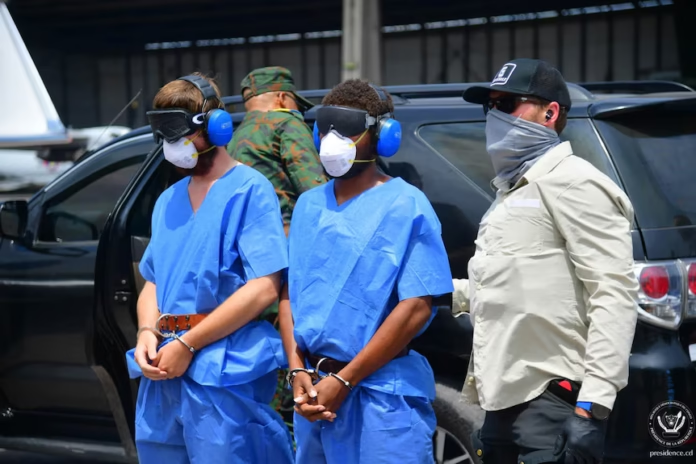Just a year ago, Tyler Thompson and Marcel Malanga were typical young men in Utah — friends tossing a football around in suburban Salt Lake City. Today, they sit in U.S. custody, facing life imprisonment for allegedly participating in a violent coup attempt against the government of the Democratic Republic of Congo (DRC).
The shocking transformation of their lives — from small-town teammates to international criminal defendants — reveals a bizarre and deadly chain of events linking three Americans to a failed assault on the heart of a foreign nation’s political power.
A Botched Coup Streamed to the World
On May 19, 2024, chaos erupted in Kinshasa, the capital of the DRC. Armed men in camouflage stormed the Palace of the Nation — the president’s official residence — and riddled it with bullets. The assailants also attacked the private home of President Félix Tshisekedi.
READ MORE: Rahul Gandhi Calls for New Age Leadership Rooted in Love and Empathy at Bharat
In a surreal twist, the leader of the operation, Christian Malanga, live-streamed portions of the attack on social media. Once a used car dealer and gold miner in the U.S., Malanga had rebranded himself as the self-proclaimed head of a DRC government-in-exile. The coup ended in a bloody shootout that left Malanga and five others dead.
Among those captured alive was his 22-year-old son, Marcel Malanga — and two other Americans: Tyler Thompson, also 22, and Benjamin Zalman-Polun, 37.
Recruitment Under False Pretenses
Court documents and family interviews paint a troubling picture of how Thompson and Zalman-Polun became involved.
Thompson, who had never traveled outside the U.S. before, thought he was embarking on a free, all-expenses-paid vacation. His family believed he was visiting Africa with Marcel Malanga for a harmless adventure. Instead, he was drawn into a brewing insurrection.
Zalman-Polun’s ties were different. A businessman with connections to gold mining interests, he reportedly knew Christian Malanga through the mining world and allegedly helped facilitate the operation.
Social media posts by Marcel Malanga prior to the coup show signs of growing militancy. Messages soliciting “warriors only” for high-paying “security jobs” hint at the mercenary-style recruitment underway. Photos of guns and captions like “war ready” littered his accounts in the months leading to the attack.
Thompson later claimed he was unaware of the true mission. However, prosecutors allege that he served a key operational role, acquiring drones intended to be weaponized with flamethrowers.
Facing the Consequences
Initially, the three Americans faced the death penalty after being convicted in the DRC of terrorism, murder, and other charges. Their sentences were later commuted to life imprisonment, and on April 9, 2025, they were extradited back to the United States.
Shackled and masked, wearing their royal blue and yellow prison uniforms, they were flown back for prosecution on U.S. soil. They now face a raft of serious charges, including:
- Conspiracy to use weapons of mass destruction
- Bombing government facilities
- Conspiracy to kidnap or kill persons in a foreign country
Prosecutors argue that the men are dangerous flight risks and have asked that they be held without bail pending trial.
Court documents outline their alleged planning activities: scouting targets, recruiting others (sometimes in exchange for promises of payment), and preparing for a violent assault intended to kill government officials and destabilize the DRC.
Marcel Malanga’s mother has maintained her son’s innocence, claiming he was manipulated and coerced by his father, who allegedly threatened violence against him and his friends.
Geopolitical Implications
The timing of the extradition is significant. The U.S. is currently engaged in negotiations with President Tshisekedi’s government over potential investments in the DRC’s rich mineral sector, including cobalt — a critical component for electric vehicles and smartphones.
Currently, Chinese companies dominate the mining sector in the DRC. Greater U.S. involvement would represent a major strategic shift, and the cooperative handling of this high-profile case could strengthen bilateral ties.
“This shows that the collaboration and cooperation between the two states is growing stronger and stronger,” said DRC government spokesperson Tina Salama.
What Lies Ahead
The three men are expected to make their first U.S. court appearances in Brooklyn, New York, although no exact date has been announced. They continue to deny any intentional wrongdoing.
For now, the stark reality remains: three Americans once bonded by friendship and youthful ambition now find themselves caught in an international web of violence, politics, and betrayal — facing the potential of spending the rest of their lives behind bars for a coup attempt half a world away.
